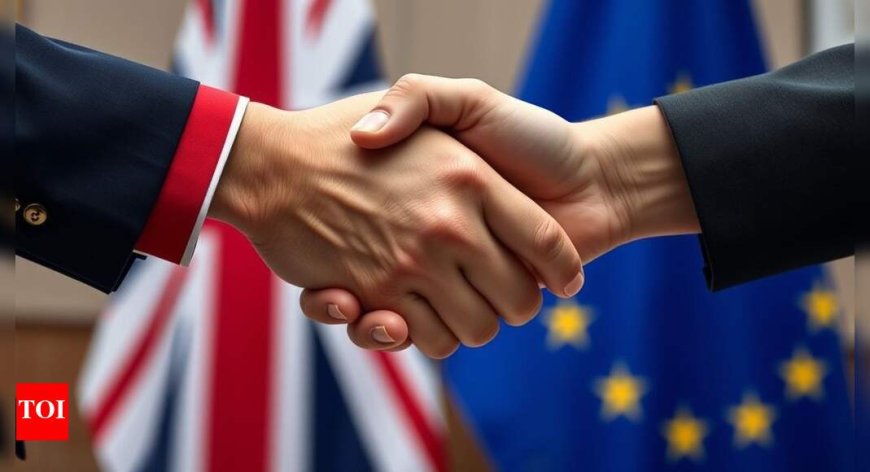EU and UK wrangle to last in push for defence pact reset
The EU and Britain look will haggle to the wire over fishing rights and food checks as they seek a deal on closer defence ties at a landmark post-Brexit summit next week. Diplomats in Brussels said negotiations were focused on getting Britain to keep its waters open for European fishermen, in return for the EU easing checks on some food imports from the UK. Other sticking points include an EU push for a scheme allowing young people to move more easily between the two sides that London fears threatens its red line on returning to free movement.

EU and UK Wrangle to Last in Push for Defence Pact Reset
Breaking News, Daily Updates & Exclusive Stories - dharmyuddh
As the pivotal post-Brexit summit approaches, the European Union (EU) and the United Kingdom (UK) are engaged in a tense negotiation over crucial defence ties. The stakes are high as they work to resolve disputes related to fishing rights and food regulations that could affect their future relationship. This intricate haggling is set to unfold against a backdrop of heightened diplomatic efforts in Brussels.
The Context of the Negotiations
The discussions set to take place next week are more than just a routine dialogue; they are a last-ditch effort to solidify a new defence pact that could reshape the trajectory of EU-UK relations. The primary focus is on allowing European fishermen greater access to British waters. In exchange, the EU is considering relaxing checks on certain food imports from the UK. This deal has become a critical point in determining how the two sides will navigate their post-Brexit reality.
Revisiting Fishing Rights
Fishing rights have always been a contentious issue between the two parties. Historically, British waters have been rich fishing grounds for EU fishermen, and securing access to these waters continues to be a priority for European leaders. As the negotiations progress, the challenge remains for both sides to strike a balance that respects the economic interests of British fishers while also allowing EU fishermen to maintain their livelihoods. Failure to reach an agreement could lead to further tensions and economic repercussions.
Food Checks and Trade Regulations
In conjunction with fishing rights, the discussions also delve into food import checks—a matter critical to both nations. The EU has voiced concerns over the quality and standards of food that Britain exports. In response, the UK is pushing for more streamlined processes that would facilitate trade and reduce bureaucratic barriers. Achieving clarity on this issue is imperative as both sides navigate post-Brexit trade dynamics.
Youths and Mobility Concerns
Another potential sticking point in negotiations is the EU's proposal to establish a scheme that allows for easier movement of young people between the two entities. This initiative has raised alarms in London, where leaders view it as a potential threat to their "red line" concerning free movement. The issue highlights the broader implications of post-Brexit policies that could affect various sectors, including education, employment, and tourism.
Looking Ahead
The forthcoming summit holds significant implications for how the UK and EU will collaborate on defence matters. The outcome of these negotiations may not only set the tone for future discussions but also shape the political landscape in both regions. With so much at stake, observers are eagerly awaiting the results, which will undoubtedly influence the relationship for years to come.
As we anticipate the outcomes of this critical summit, it is essential to reflect on the intricacies of these negotiations and their broader effects on EU-UK relations. For continuous updates on this evolving story, visit dharmyuddh.







